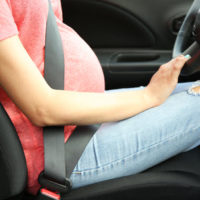The Additional Risks to Pregnant Women Involved in Car Accidents

Learning that a baby is on the way is a happy moment in life that deserves all the celebration which typically accompanies this news. Because of the delicate and vulnerable situation a growing fetus occupies during development, the mother changes her habits and activities to protect the baby, and generally exercises caution as she goes about her day. Riding in a car brings unavoidable inherent risk to everyone, and especially to pregnant women. If these women are in car accidents, they have the additional worry of how the accident could or did impact their unborn child. While someone’s liability for an accident is likely not the first thing expectant parents consider, if negligence was the reason for accident, the mother may have legal claims for herself and the unborn child. The law on recovery for injuries to an unborn fetus is complex, but a discussion on when a parent may have grounds for compensation in the event of a car accident will follow below.
Possible Effects of a Car Accident
Pregnant women can face a number of serious, and sometimes fatal, injuries to an unborn fetus. Unfortunately, this risk is compounded, according to a study by Canadian researchers, by the women themselves. The researchers found that pregnant women were 42% more likely to experience a serious car accident during the second trimester because women tend to feel the best during these months, and as a consequence, do not always account for the physiological changes that can impair concentration and reaction time. Both the woman and the unborn child are vulnerable to physical injury during pregnancy, which can escalate the types of injuries suffered in a car accident. Serious effects from a car accident that could endanger both the mother and fetus include:
- pre-term labor;
- miscarriage;
- internal bleeding;
- birth defects; or
- triggering a high-risk pregnancy.
Pain and Suffering
When a person is injured due to someone else’s negligence, the law allows the injured party to file a personal injury lawsuit to recover compensation. In the case of a pregnant woman and her unborn child, the woman will always have the right to sue for her own injuries. However, for the unborn child, the situation becomes murky if the child dies in womb. Typically, when someone dies from the actions of another person, the family of the victim has right to sue for wrongful death on behalf of the deceased. Essentially the family is taking the place of the victim, and asking for compensation for lost present and future wages, medical bills, pain and suffering and the like. A fetus, on the other hand, is not given the same legal status in Florida because it is not considered a person since it could never sustain life independently. Consequently, the parents cannot recover damages for pain and suffering based on wrongful death. However, the parents can file a personal injury suit for negligence because the loss of the fetus is considered a physical injury to the mother, which entitles the mother, at least, to ask for damages for emotional distress. The law is unsettled as to whether a father has the same ability because the law generally requires that negligence claims, including damages for emotional distress, must be based on a physical injury to the party. But, the law is split on when this applies to unborn fetuses. If the fetus is 18 weeks or younger, the father cannot sue for emotional distress damages, but if the fetus is 41 weeks or more, he can. The time in-between is unsettled at this point, but the father is likely barred during this period as well.
Get Legal Advice
If you have suffered the loss of a child, few things are more devastating. Knowing that the loss was avoidable but for the negligence of another person makes the situation all the more difficult, and the law does gives parents the right to sue for compensation. The Miami law firm of Pita Weber Del Prado understands the sensitive nature of the death of a child, and will work to hold the responsible party accountable. Contact us for a free consultation.
Resource:
cmaj.ca/content/early/2014/05/12/cmaj.131650



